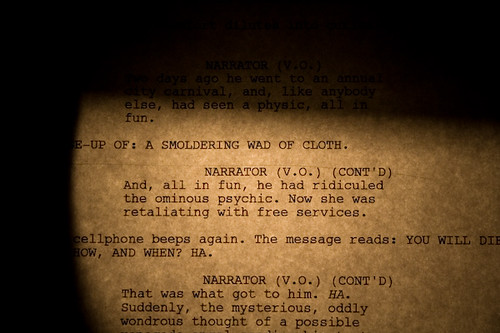Chuck Sambuchino on Mar 25 2013 | Writers Unboxed
Plenty of times, writers come up with an idea for a novel that could translate visually to film. The good news is that if you want to see your manuscript converted into a screenplay, there are two different routes that would make an adaptation possible.
Most books that get released by a major publisher or are repped by an established agency get passed to an agent who tries to drum up interest in film/TV rights for a project. This makes total sense. A writer creates a good story, so the obvious goal is to sell it through every means possible — be that print books, e-books, foreign rights translations, serial excerpts, audio books, and, yes, movies/TV. If your new book-to-film agent (usually brought onboard by your book agent) can generate adaptation interest from producers, your work gets bought/optioned by Hollywood, and you’re off and running. This exact thing happened to my humor book, How to Survive a Garden Gnome Attack. Sony optioned the book and hired a screenwriter to adapt the work.
But what if you want to see your work adapted into a screenplay, but are either indie-publishing it or the work hasn’t sold yet? The obvious option is to –
ADAPT IT YOURSELF: 7 IMPORTANT TIPS FOR BEGINNERS
You can always just take matters into your own hands and compose the script yourself on spec. But the truth is that writing a screenplay is a completely different monster than tackling a novel or memoir. If your finished product doesn’t fit the usual mold of what a screenplay should look like, then a producer or agent won’t even consider it, and your time was wasted. So with that in mind, I wanted to lay out several simple-yet-important tips on how to write a script for any persons considering adapting their own book into a screenplay. Keeping in mind there is still much more to learn beyond this post, here are 7 basic pieces of advice to get you started if the concept of scriptwriting is new to you.
1. Watch your length.
Just as books have typical word count ranges, screenplays have length requirements, too — and the recommended length for a beginner’s screenplay is 90-109 pages. Since each page represents one minute of screentime, that sets up your movie to be 90-109 minutes. Most writers go wrong in this arena by trending long.
2. Screenplays thrive on minimalism.
Always be thinking about how to cut, cut, cut. Screenplays rely on brevity. When characters have to say something, the best value you can provide is getting your point across in as few words of dialogue as possible. When you have to describe a scene or explain that a helicopter explodes, the quicker you can properly convey such information, the better you are. Give us information and dialogue in short, quick bursts. A lot of your novel will end up on the cutting room floor throughout the adaptation — and that’s OK. Plenty of a novel/memoir content does not translate well visually to the screen, so cutting out sections or characters or subplots actually will improve your final script. (If you’re not good at killing your darlings, perhaps screenwriting is not the best arena for you.)
And speaking of minimalism, it’s your job to write, not direct. That means you should never include any camera notes such as “Dolly in” or “Close up.” Avoid these directorial cues on every page.
More

No comments:
Post a Comment